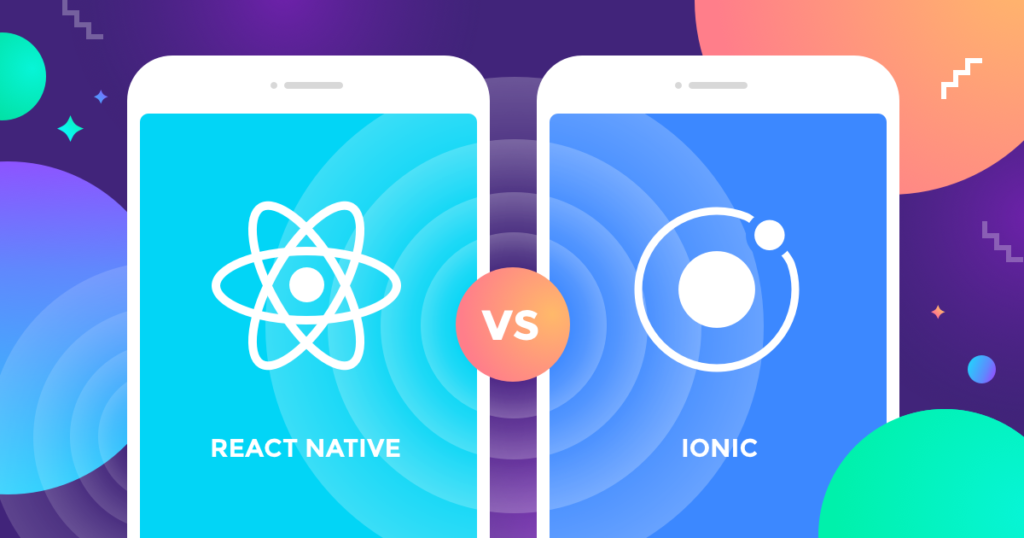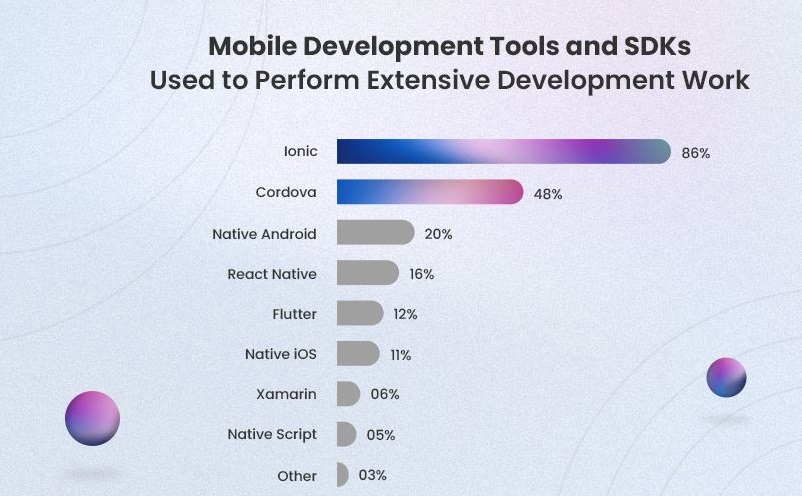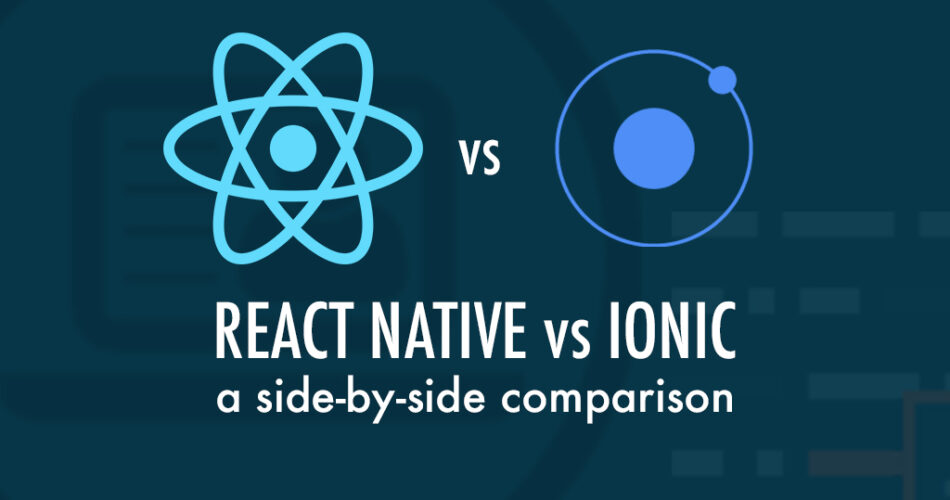In this blog, we will discuss two of the best mobile app framework, React Native vs Ionic. They are a cross-platform framework to develop non-native applications. You can use both of them to create iOS and Android mobile apps. With their astounding frameworks, you will be able to easily create prototypes and publish apps on different platforms using a single source code.
In order to develop an application, we have to write the same code again and again on each platform. This can be very time consuming, expensive and wants that expertise. For solving this issue, there are various hybrid app development frameworks in the market now. Now we will understand React Native vs Ionic by discussing similarities and differences of the JavaScript cross-platform frameworks.

Also Read: Best programing language to learn first
React Active
GitHub: 101k Stars and 21.7k Forks
The developer of React Native is the most famous Facebook unlike Ionic that was created by a startup. It is a cross-platform development framework created in 2015. React Native allows you to develop native apps using the code of React. It will work in the background of the device of the user and then use bridging so that it can interface with the native components.
The developers will be able to create Android and iOS mobile with JavaScript using the React Native app development. It smoothes cross-platform development through the supply of platform-independent native components. It has its uses in variety of products such as the marketplace part of the Facebook app. You can also develop a TV application for Apple TV and Android TV by using React Native.
“The primary goal of React Native is for your code to execute natively on Android and iOS devices. Most React Native features were able to reach 95–100% shared code, with only 0.2% of files being platform-specific.”
Advantages of React Native
React Native has various benefits that can help your project. In this comparison of React Native vs Ionic, they are as follows:
- Hot Reloading: This is one of the most crucial and useful characteristic of React Native. It will allow you to inject that latest version into your existing application without any change in its state.
- Performance: Secondly, its code is compiled directly to native APIs. This will result in faster performance of the applications.
- JavaScript Usage: You will be able to use JavaScript during the development of an app in React Native. Moreover, you can also use native modules in Java, Kotlin, Swift or Objective C.
- Pricing: Lastly, any developer will be able to use React Native and its libraries free of cost. This is because it is completely open-source.
Disadvantages of React Native
Now we will discuss the disadvantages of React Native in this blog of React Native vs Ionic. They are as follows:
- Larger App Size: Firstly, React Native APK has a large size in comparison to other apps. Basically, the apps that are developed with native technologies of Java or Kotlin.
- Longer Development Time: You will not be able to use the Write-Once-Use-Everywhere approach with React Native. You have to develop a separate version for each platform and device. So, it will take a longer development time unlike Ionic development.
- Steep Learning Curve: It is considerably difficult to learn and understand React Native. The freshers especially will not find the app development easy.
- Long Initialization Time: Lastly, the runtime take some time initialize even if the user has the latest devices and systems.
Framework of Ionic
GitHub: 46.3k Stars and 13.5k Forks
Ionic was developed by Drifty Co in 2013. You can create high-quality cross-platform applications using Ionic. It is an open-source UI toolkit to create PWAs (Progressive Web Apps). Additionally, you can develop mobile apps using web technologies such as CSS, HTML, and JavaScript. It also provides mobile-optimized web technology-based components and native APIs. But it is interesting to know that Ionic was launched in aid for multiple front-ends including React.js, in 2019.
Its famous objective is “write once and use everywhere” meaning developers only need to create one app for different devices and platforms. So, you can easily develop hybrid mobile apps, desktop apps, and PWAs. You can use React.js, Vue.js, Angular or simple JavaScript to create a hybrid mobile app with the help of Ionic.
Ionic React
You may already know that Ionic React is an open-source UI. But it is also a Native API project for iOS, Android, PWAs, and Electron apps. It leverages React and traditional web technology for offering cross-platform UI components and native capabilities. It is the famous Ionic frameworks’ official version of the React. Ionic React is a favourite of the developers and has authorized various apps for companies such as T-Mobile, Schneider, Yara International, IBM, etc.
Advantages of Ionic
Let’s look at the list of advantages that Ionic can provide for your enterprises in this comparison of React Native vs Ionic :
- Easy Documentation: It has a very effortless documentation. You can easily understand its procedure of configuration and development. Developers will find everything well-structured and written.
- Native-styled UI Components: You can use Ionic to develop an app that will feel native on every platform with its abundant UI elements.
- Easy Learning Curve: It is very simple to learn and understand Ionic. You just need a proper knowledge of React, Angular, and Vue, and Apache Cordova.
- Fast Testing Cycle: Lastly, the developers can test the code quality in an undemanding way in the browser. There will be no heavy emulator loading.
Disadvantages of Ionic
Ionic has some cons that you should know before selecting the Ionic framework for your project. Let’s dig into the disadvantages in the comparison of React Native vs Ionic:
- Bugs Issue: Firstly, there has been a claim among the developers that every new version of Ionic brings new bugs. Some of them include updating outdated plugins, acquiring updating outdated plugins, or moving to the latest releases.
- Poor Performance: The performance of Ionic is slower in comparison to the native mobile apps. But there are many users that don’t see this performance gap.
- Early Adopter Risk: Ionic is in its development stage so you can call it a newbie. There are constant changes in its support and standards and you may find its libraries fully rewritten at any time.
- Not Suitable for Gaming Apps: You cannot use Ionic for developing high-end graphics-dependent game applications.
React Native vs Ionic
Firstly, we will discuss the similarities between these two in the comparison of React Native vs Ionic.
React Native vs Ionic: The similarities
- The platforms will look identical on the basis of their descriptions especially to the freshers.
- You can create a native mobile app using React JavaScript framework and JavaScript. On the other hand, Ionic development will allow you to create web, mobile, and desktop apps. Ionic will use HTML, CSS, and JavaScript in this case.
React Native vs Ionic: The differences
We have already given you lot of details on React Native vs Ionic. Finally, we will have a face between these two.
Popularity
In case of popularity, React Native is an easy winner in comparison to Ionic on the basis of the the GitHub platform. But Ionic is also growing slowly but steadily and contains 238 versions.
Now, let’s look at some popularity stats according to the Developer survey 2020.

On the basis of the 2022 Stack Overflow survey, the popularity rate of React Native (12.5%) is higher in comparison to Ionic (5.2%).
Winner: React Native.
Technology Stack
- React Native: Firstly, React Native uses the famous framework React that is written in JavaScript. It uses React because Facebook developed both of these frameworks as an open-source.
- Ionic: In case of Ionic app development, you can use React, Angular, or even Vue. There is a lot of flexibility in its technology stack as it uses JavaScript, HTML5, and CSS. With the latest release of Ionic 4, you will be able to use it with any web development framework.
- Winner: Ionic.
Performance
- React Native: Developers prefer React Native because it is closer to native performance. It engages the same building blocks of native apps and also uses the same appearance. There is fast performance and responsiveness in case of React Native but the budget is high.
- Ionic: As you know, it has a hybrid outlook so Ionic is best for rapid app prototyping. It will not serve the developers that crave for native apps. So, there may be performance issues and inactivity. Even though Ionic is great to develop beautiful user interfaces but it lags behind in performance.
- Winner: React Native.
Third-party Integration
- React Native: There is an excess of libraries in React Native. So, there will be no shortage of third-party plugins. But you may face difficulty while integrating these third-party plugins.
- Ionic: Ionic has a huge library where you can easily find plugins like Ionic, Apache/Cordova, etc. In comparison to React Native, you can easily bespoke modules with Ionic.
- Winner: Ionic.
Enterprise Compatibility
- React Native: It has become a crowd favourite because of connection with big organizations like Facebook, Airbnb, Wix, etc. But it remains unclear whether the framework of React Native is commendable for enterprise use.
- Ionic: Enterprises can easily develop PWAs and hybrid/native apps by using Ionic. So, we can say that it has better enterprise compatibility and favourable framework.
- Winner: Ionic.
React Native vs Ionic: Tabular comparison

Can we use Ionic with React Native?
This is one of the question that is frequently asked. So we will answer it for you and the answer is Yes. It is called as Ionic React that is the official native React version of the Ionic. This will be ideal for those developers who want to develop a faster performing having some functionalities of React.
Conclusion
As you can see in this comparison of React Native vs Ionic, we can only say that both of these frameworks are best in what they do. So, the developers have to decide on their needs i.e., project requirements, functionalities, etc. We hope that this blog will help you in selecting the one that will be best for your project. Thanks!
